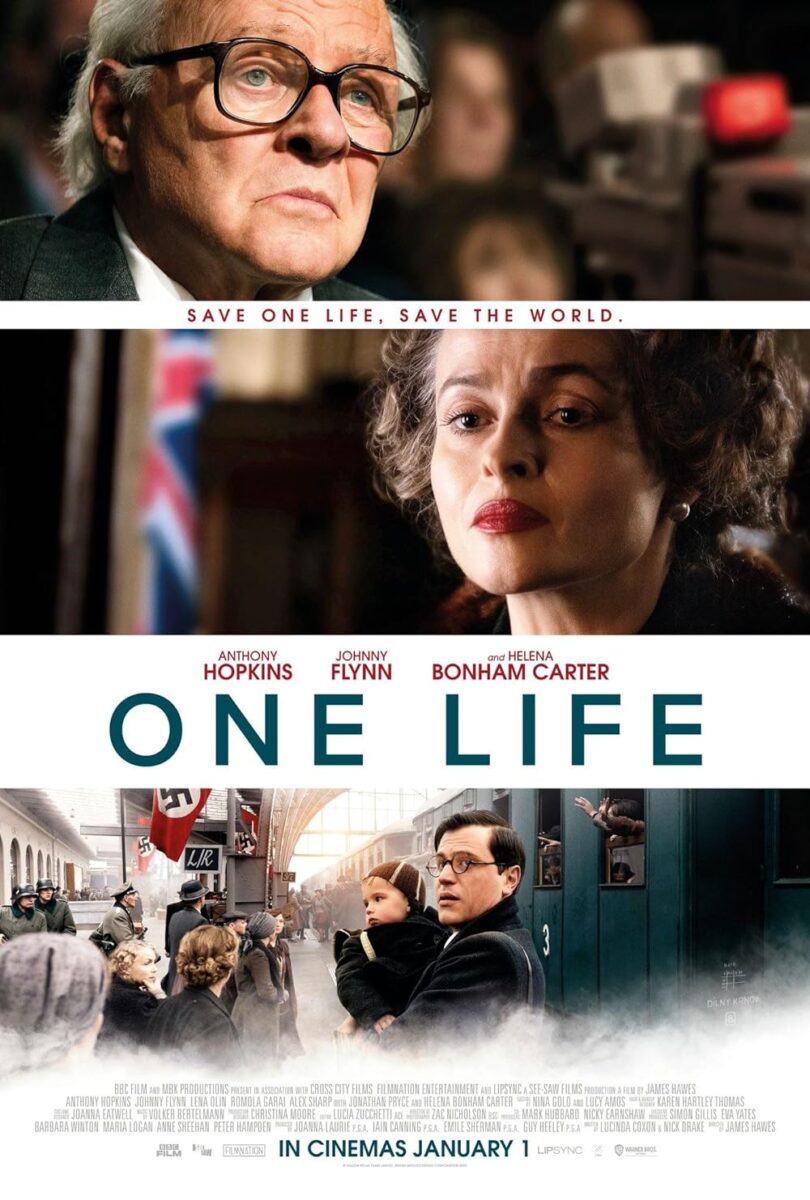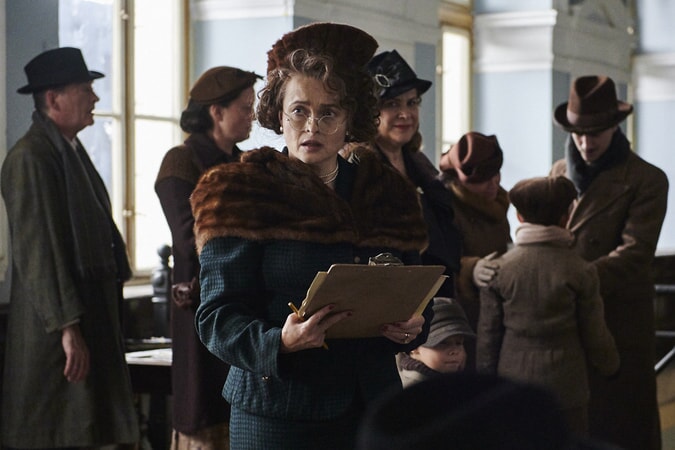Anthony Hopkins stars as Nicholas Winton and Helena Bonham Carter co-stars in director James Hawes’ biopic “One Life”, currently showing in cinemas. The film depicts how in 1938, Winton, a British stockbroker turned humanitarian, worked with an NGO refugee committee to save over 600 Jewish children in Prague from the imminent Nazi invasion and occupation of Czechoslovakia. With the Nazis at the border posing a direct physical threat, Winton orchestrated the escape of these children to Britain, rescuing them from almost certain death under the Nazi regime.
One Life tells the story of Nicholas Winton, a decent, liberal-minded man who helped Jewish refugee children escape Nazi-occupied Czechoslovakia. The current Tory government likely would have denounced Winton as a “woke cosmopolitan” who naively does not understand Britain’s supposed inability to accommodate refugees who enter the country by any means. Similarly, Keir Starmer recently decried even legal migrant numbers as excessive. Both Starmer and the Tories echo the same depiction of refugees as a threat to British society and culture, while focusing blame on the evils of “people smugglers” facilitating desperate refugees. Just as in Winton’s time, this toxic rhetoric demonises those helping vulnerable refugees flee persecution rather than recognising the humanitarian crisis forcing families to make such difficult decisions about their children.

No doubt today’s mainstream politicians would have denounced Winton’s acceptance of the forged visa documents that were produced when he could not get enough official ones. Sometimes breaking the law in order to save children’s lives is justified.
At one point in the film, a civil servant from the Home Office explains the conditions for the visas. They included definite promises from families to look after them and a £50 fee. At the time, that was a considerable sum—about £2777 in today’s money. In this respect, things have gotten worse. A visa costs £1876 today, but you have to add the health service charge of £1175 to make the total cost even greater than in 1938. As the film shows, Winton had to be quite belligerent in his dealings with British ‘officialdom’ to get any sense of urgency. At the time, there was little information provided about Nazi repression, and there was still plenty of antisemitism expressed in official institutions and among ordinary people.
“At one point in the film, a civil servant from the Home Office explains the conditions for the visas. They included definite promises from families to look after them and a £50 fee…As the film shows, Winton had to be quite belligerent in his dealings with British ‘officialdom’ to get any sense of urgency.”
Unlike today’s government and Labour opposition, Winton succeeded in bringing urgent attention to the grave physical danger facing the Jewish refugee children, stirring public support for their rescue from Nazi-occupied Czechoslovakia. Tragically, the plight of present-day refugees from countries like Sudan, Afghanistan, and Syria fails to resonate with the public or government to the same extent as the threat facing the Jewish children that Winton saved. You could argue that the resources in an immediate pre-war economy for welcoming refugees were much, much worse than they would be in 2024. Once the call went out by Winton for sponsoring families, the people showed their solidarity, just as we seen over the last couple of years with the thousands of families who put up Ukrainian refugees in their homes.
Today, we still have desperate families sending their children on boats. In 1938, they sent them on trains across Nazi Germany in the hope they could have a better life than themselves. The parents were aware of the risks and the awful future they might face, but they saved their children first. Scores of unaccompanied children arrive in Britain every month. The media and government just see this as some sort of canny manoeuvre rather than acknowledging what sort of terrible choice this represents for parents. Shamefully, the Home Office today squanders time and resources attempting to dispute the stated ages of child refugees in order to reject their asylum claims.
“Today, we still have desperate families sending their children on boats. In 1938, they sent them on trains across Nazi Germany in the hope they could have a better life than themselves.”

The film jumps back and forth between the postwar period and the events of 1938. It shows that Winton always accepted that it was a team effort, and he always rejected the heroic label. The brave people who stayed in Prague to load the kids onto the trains and accompany them were a great help to him. Winton’s mother in London also helped open doors.
Nevertheless, his leadership and resilience in the face of officials who told him it could not be done were important. He was an unlikely hero, coming to Prague from a comfortable job in the city after hearing about the Nazi threat from a friend. As he said, his strengths were organisation and attention to detail. Like a bulldog, he just kept going, pushing himself and others. History can be made by paper pushers in certain circumstances when a piece of paper can save your life.
The film graphically shows the reality of the desperate families, something that is rarely done in the mass media today. Politicians tend to demonise rather than humanise migrants. At the end of the film, when Winton is reunited many years later with hundreds of the migrant children, we learn of their contributions to the host societies. Alf Dubs, the former Labour MP and peer, was one of them. Unsurprisingly, he has spoken out in defence of refugees or migrants more robustly and truthfully than Keir Starmer.
As a biopic, it is pretty conventional, with a recurring series of flashbacks. It captures and respects the dedication and generosity of the volunteers working with the refugees. The flashback structure is kept simple, unlike the confusing set-up in the Oppenheimer movie. Anthony Hopkins does a great job portraying Winton; even his family descendants have been impressed by how he has captured Nicolas. The film also reveals how this story was pretty much buried until Esther Rantzen’s That’s Life 1988 programme pulled off a poignant scoop by re-uniting Winton with the-grown-up people he had helped. I suppose his story does not fit so easily into the way the Second World War is constructed as an ideological narrative full of battle scenes, spitfires, Colditz, and the Great Escape.
Where the film could be improved is to make more explicit the relationship of the story to the present toxic public debate about refugees and migrants. Winton does make a reference to the plight of refugees that is mentioned on the radio in a scene later in his life. A lot of these biopic films have a series of links to what happened next or other information before the closing credits. That would have been the perfect moment to make a few succinct links with refugees today. Unfortunately, that occasion was missed.
“Where it could be improved is to make more explicit the relationship of the story to the present toxic public debate about refugees and migrants. Winton does make a reference to the plight of refugees that is mentioned on the radio in a scene later in his life.”
Overall, it is a film with a mass distribution that portrays people working to support refugees and migrants in a positive way. In these dark times, we should at least be grateful for that.
If you need an update on how the hostile environment is continuing for asylum seekers and migrants, there is an excellent article by former Islington councillor Sue Lukes over at LabourHub that gives you all the information you need to know. She takes apart the self-serving demagogy of Sunak to cut the backlog of asylum claims.
Art (53) Book Review (121) Books (114) Capitalism (65) China (80) Climate Emergency (98) Conservative Government (90) Conservative Party (45) COVID-19 (44) Economics (40) EcoSocialism (55) Elections (83) Europe (46) Fascism (56) Film (49) Film Review (68) France (70) Gaza (60) Imperialism (98) Israel (124) Italy (46) Keir Starmer (52) Labour Party (111) Long Read (42) Marxism (48) Palestine (169) pandemic (78) Protest (152) Russia (340) Solidarity (142) Statement (48) Trade Unionism (141) Ukraine (346) United States of America (132) War (368)

